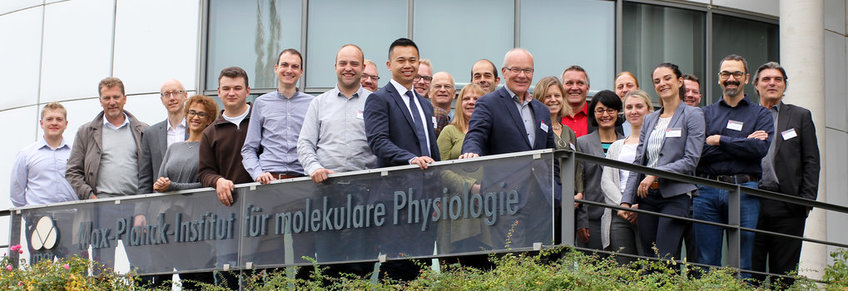
Chemical Genomics Centre begins new funding period
The Max Planck Society in collaboration with AstraZeneca, Merck and Pfizer starts the third funding period of the Chemical Genomics Centre (CGC). This role model for successful collaboration and partnership between academia and industry aims to accelerate scientific innovation..
08 November 2018
The Chemical Genomics Centre (CGC) was established in 2005 by the Max Planck Society and several industrial partners under the leadership of Prof. Dr. Herbert Waldmann, Director at Max-Planck-Institute of Molecular Physiology in Dortmund (MPI). (www.cgc.mpg.de)
The mission of the CGC is to address challenging scientific problems in the field of chemical biology and to explore and validate high-risk approaches to cutting edge precompetitive research which could enable the generation of translational science in the medium to long term. This includes the development of innovative chemical methods, novel biology and assay methods and the discovery of novel targets.
During the first two funding rounds (CGC I: 2005-2010; CGC II: 2012-2017) 69 unique research projects were run, 193 papers published, and seven patent applications were filed. The CGC constitutes a talent incubator for young Group Leaders as a stepping stone towards prestigious positions in academia and industry. It offers PhD students and Post Doc researchers an essential training ground for personal and professional development.
With the aim to sustain this successful scientific joint initiative, a new five year funding period (CGC III: 2018-2023), officially started on October 19th, 2018. The CGC III consolidates the collaboration between the Max Planck Society and the pharmaceutical industry. The previous sponsors AstraZeneca and Merck have been joined by Pfizer as a third partner.
The CGC III consortium will fund four excellent Group Leaders and their research teams. They will be located in premises directly adjacent to the at Max Planck Institute of Molecular Physiology where they will benefit from the developing Dortmund Science Hub and from the scientific expertise of the industrial partners.
Currently, the Group Leaders, whose work will be funded through the CGC, are: Dr. Peter ‘t Hart and Dr. Peng Wu.
Peter ‘t Hart: Dr. Peter ‘t Hart received his bachelor degree in Chemistry from the Rotterdam University of Applied Sciences and went on to obtain his MSc degree from Utrecht University in Pharmacy. He stayed at Utrecht University for his PhD under supervision of Prof. Dr. Nathaniel Martin where he used phage display to identify novel antibiotic peptides targeting bacterial cell-wall components. After obtaining his doctoral degree he moved to the Max Planck Institute for Molecular Physiology to work as an Alexander von Humboldt postdoctoral fellow with Prof. Dr. Herbert Waldmann, where he focused on macrocyclic protein-protein interaction inhibitors of histone modifying complexes in collaboration with AstraZeneca.
The interest of the Hart lab are the interactions between non-coding RNAs and proteins and the inhibition of such interactions. Non-coding RNAs are involved in a wide variety of cellular functions for which the formation of an RNA-protein complex is often required. A specific focus of the lab is the role such complexes play in epigenetics. Knowledge on how to inhibit such interactions is required for selective inhibition of cellular functions and will be valuable for the development of innovative therapeutics. Our lab will develop assays to identify novel macrocyclic inhibitors of RNA-protein interactions in a high throughput fashion. Furthermore, the lab also aims to understand the properties macrocycles require to have both high affinity as well as sufficient cell-permeability.
Peng Wu: Dr. Peng Wu received his Doctoral Degree in Medicinal Chemistry from Zhejiang University in 2012. He then performed postdoctoral research at the Technical University of Denmark and the University of Copenhagen. In 2016, he moved to Cambridge, MA, working as Research Fellow in Chemical Biology at Harvard, Broad Institute, BWH, and MIT. In 2018, he was appointed as Assistant Professor in the Department of Drug Design and Pharmacology at the University of Copenhagen. Since 2018, he has been Group Leader at the Chemical Genomics Centre of the Max Planck Institute of Molecular Physiology in Dortmund. Peng’s research interest originates from the interface between chemistry and biology. He will focus on development of novel small molecule-based chemical modulators to manipulate the pervasive protein-RNA interactions. His aim to develop a platform strategy to tackle the challenging targets of protein-RNA interactions. Peng investigate various approaches to discover chemical probes that unfold the biological mechanisms of protein-RNA regulatory networks and provide drug leads for small molecule-based therapeutics with new mechanisms of action.